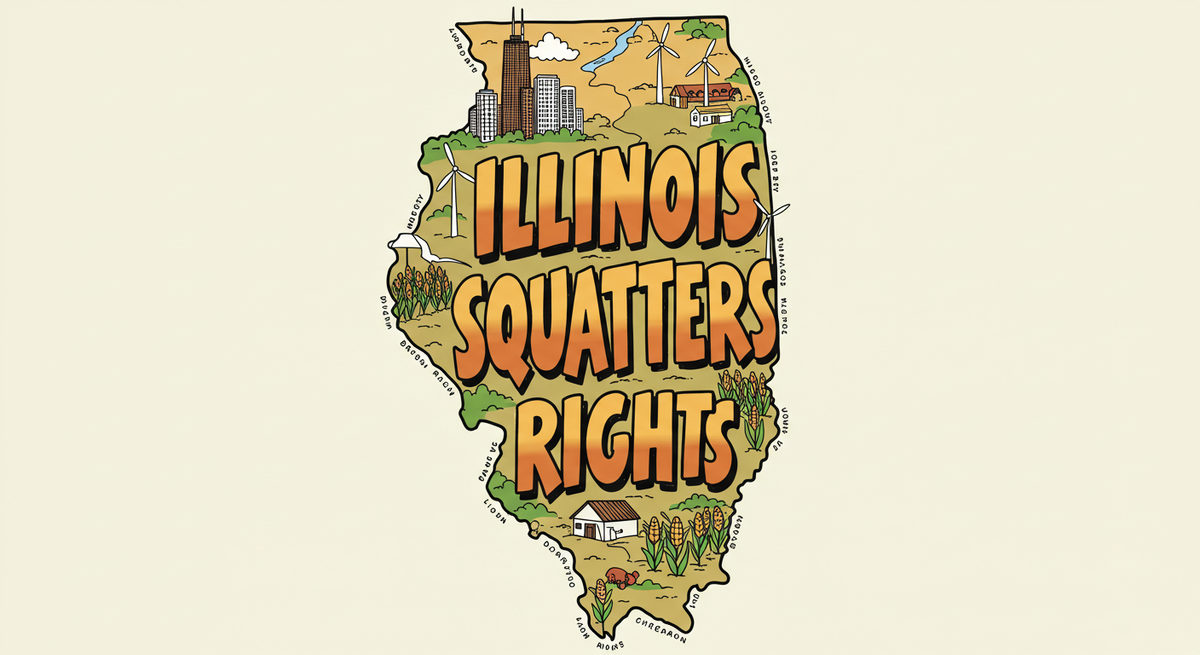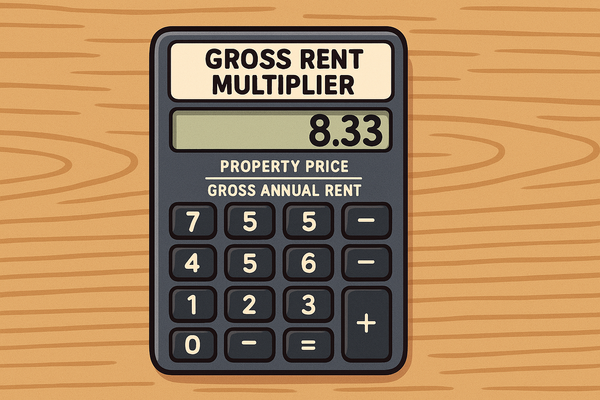Illinois Squatter's Rights Guide: 2025 Laws, SB 3658, and Property Protection
Illinois is targeting squatter issues with Senate Bill 3658 advancing through the legislature in 2024, which aims to strengthen how unauthorized property occupation is handled throughout the state.

A squatter is someone who occupies a property without the owner's permission and sometimes even claims legal ownership. In Illinois, this issue has gained significant attention with Senate Bill 3658 advancing through the legislature in 2024-2025, which aims to strengthen how unauthorized property occupation is handled throughout the state.
For property owners, understanding Illinois' squatter rights laws is crucial to protect your investment and prevent potential loss of property through adverse possession claims.
Smoke & Mirrors... or just smoke: You've heard people joke about lighting their house on fire after seeing a spider inside, or a snake in the garage. But this takes it to a whole different level. In one infamous Chicago case, a desperate landlord orchestrated an elaborate fake "fire" to remove squatters after legal channels failed. The scheme involved strategically placed smoke bombs and flame-shooting drums that created the illusion of a house ablaze—driving the squatters to flee before the landlord quickly reclaimed the property with hired security. This was most certainly effective, but it was a potentially dangerous (and definitely illegal) tactic. Ultimately, it simply illustrates the frustration many Illinois property owners face when dealing with squatters.
Key Takeaways
- Illinois requires squatters to occupy property continuously for 20 years before they can file a standard adverse possession claim
- With "color of title" and payment of property taxes, the required period reduces dramatically to just 7 years
- The advancing Senate Bill 3658 would give law enforcement more authority to remove squatters
- Squatters often use forged lease agreements to convince police that their occupation is a civil rather than criminal matter
- Illinois has one of the longer standard adverse possession timeframes nationally (20 years), providing stronger protection for property owners
- Regular property inspections and comprehensive security measures are the best prevention against squatters
- The "professional squatter" phenomenon has emerged in Illinois, particularly in Chicago
While Illinois law states that an individual may attempt to gain title and ownership of a property through adverse possession after residing there long-term, this process is significantly impacted by specific requirements and potentially by Senate Bill 3658.
If a squatter's entry onto the property was unlawful, the proposed legislation would allow property owners to request expedited removal by law enforcement, potentially preventing the squatter from meeting the continuous residence requirement.
Even if a squatter remains on the property for the required timeframe, they must also meet strict requirements, including open and notorious possession, exclusive control, payment of property taxes, and, in many cases, having "color of title," before they can initiate a legal claim for adverse possession.
Understanding Illinois Squatter Rights in 2025
In Illinois, squatting itself is not legal, though squatters have historically had certain rights through the doctrine of adverse possession. This legal principle allows individuals who occupy abandoned or neglected property without permission to potentially gain legal ownership after meeting specific conditions over a designated period.
It's important to understand the distinction between squatting and trespassing. While trespassing is a criminal offense that involves entering property without permission, squatting typically involves a person living on a property for an extended period without authorization. The distinction becomes important in how law enforcement can respond to each situation.
With the potential implementation of SB 3658, Illinois is shifting from treating squatting as a purely civil matter to one with potential criminal implications, potentially strengthening property owners' rights significantly.
Illinois Adverse Possession Requirements
In Illinois (much like other states) squatters must meet multiple criteria to successfully claim ownership of a property they've been squatting at known as the "OCEAN" framework:
Open and Notorious
The occupation must be visible and obvious to anyone, including the rightful owner. This prevents hidden or secretive occupation from qualifying for adverse possession. The squatter must live openly as if they were the rightful owner.
Continuous
The squatter must occupy the property continuously for 20 years without interruption under standard circumstances. With color of title and payment of property taxes, this period reduces to 7 years. Any temporary abandonment resets the clock on the adverse possession claim.
Exclusive
The possession must be exclusive, meaning the squatter cannot share the property with others, including the rightful owner. The squatter must have sole control over the property.
Actual
The squatter must physically occupy the property and treat it as their own. This includes maintaining the property, making improvements, or otherwise demonstrating actual possession. Simply claiming the property without physical occupation is insufficient.
Hostile
In legal terms, "hostile" does not imply aggression but rather indicates that the occupation is without the owner's permission and against their rights. This can include situations where the squatter honestly believes they have a right to the property due to a misunderstanding or error.
Beyond these five fundamental requirements, Illinois law imposes additional conditions:
- The squatter must pay all property taxes for the property during the occupation period
- They must make improvements to, cultivate, or protect the property
- In many successful cases, they must have a "color of title" - a document that appears to give them ownership but contains a legal defect
Illinois' SB 3658: The Potential Game-Changing Squatter Law
As of early 2024, Senate Bill 3658 was advancing through the Illinois legislature, representing a significant potential change to Illinois's squatting laws. This legislation, if passed, could fundamentally transform how unauthorized property occupation is addressed in the state.
Key Provisions of SB 3658:
- Legal Standing Clarification: The bill explicitly states that "no person shall have a right or legal standing to occupy or remain on or in any real property, residence, or structure" without proper documentation of ownership or rental agreement.
- Documentation Requirements: To claim legal standing to occupy a property, individuals would need to show either a written lease/rental agreement with the property owner, documentation of rent payments to the owner, or evidence of an oral/written agreement establishing a property interest.
- Enhanced Law Enforcement Authority: The bill aims to give police more authority to remove squatters, addressing a common frustration among property owners that police currently have limited ability to intervene in what they often classify as civil matters.
- Adverse Possession Restrictions: The legislation would potentially amend the Code of Civil Procedure to restrict illegal possession during a 7-year period from being used for adverse possession claims.
This legislation represents a decisive response to increasing concerns about squatting incidents throughout Illinois. While maintaining the legal concept of adverse possession, the law would create clearer pathways for property owners to remove unauthorized occupants without enduring prolonged civil proceedings.
How Illinois's Approach Differs From Other States
Illinois's approach to squatter rights has evolved to become one of the more property-owner friendly in the nation when considering standard timeframes, particularly if SB 3658 passes. Here's how Illinois compares to other states:
Adverse Possession Timeframes
| State | Required Occupation Period | Tax Payment Required |
|---|---|---|
| Illinois | 20 years (7 with color of title and taxes) | Yes |
| Florida | 7 years | Yes |
| California | 5 years | Yes |
| New York | 10 years | No |
| Texas | 10 years (3 with deed) | Yes |
| Georgia | 20 years (7 with deed) | Yes |
| Alabama | 10 years (color of title) | Yes |
Enforcement Approaches
Unlike many states that treat squatting primarily as a civil matter requiring court proceedings, Illinois's SB 3658 would create a more direct pathway for law enforcement involvement. This represents a significant shift toward treating unauthorized occupation with greater severity, similar to Florida's recent HB 621 law.
Squatters rights laws in states like California and New York still typically require property owners to go through lengthy eviction processes even for clear cases of squatting. In contrast, Illinois is moving toward enabling authorities to verify ownership claims and remove unauthorized occupants more directly.
Criminal vs. Civil Treatment
Illinois's proposed legislation would establish clearer pathways for addressing squatting as a potential criminal matter rather than solely a property dispute. This approach aligns with recent trends in states like Florida and Texas, which have also moved toward stronger criminal deterrents for squatting activities.
Legislative Trends
Following Florida's lead with HB 621, states including Illinois, Texas, Georgia, and Tennessee are strengthening property owners' rights against squatters. Illinois appears to be part of this national trend toward creating more efficient remedies for property owners facing unauthorized occupation.
The differences highlight Illinois's evolving approach to protecting property rights through a multi-faceted strategy that combines traditional adverse possession doctrine with enhanced enforcement mechanisms.
How to Prevent Squatters in Illinois Properties
Prevention remains the most effective strategy for property owners. Here are key preventive measures to protect your property from squatters:
Regular Property Inspections
- Visit vacant properties regularly or hire a property management company to conduct routine inspections
- Document the condition of the property with dated photographs
- Maintain landscaping and exterior appearance to show active ownership
Security Systems and Monitoring
- Install visible security cameras and alarm systems
- Consider smart home security that provides remote monitoring capabilities
- Use motion-activated lighting around the property perimeter
- Install sturdy locks, security doors, and window reinforcements
Property Maintenance
- Keep utilities active but on minimum service levels for vacant properties
- Maintain landscaping and exterior appearance
- Collect mail regularly or have it forwarded
- Schedule timed interior lighting to create the appearance of occupation
Documentation and Signage
- Post "No Trespassing" signs prominently on the property
- Maintain comprehensive documentation of ownership
- Keep records of all property taxes paid and improvements made
Community Involvement
- Inform neighbors about vacant properties and ask them to report suspicious activity
- Join neighborhood watch programs
- Consider hiring a house-sitting service for extended absences
Professional Management
- Retain a property management company for vacant properties
- Consider short-term rentals if appropriate for your property
- Ensure quick tenant placement to minimize vacancy periods
These preventive measures not only deter potential squatters but also help establish a clear record of active ownership that can prove invaluable if adverse possession claims arise.
Legal Process for Removing Squatters in Illinois
If prevention fails and you discover squatters occupying your property, Illinois currently requires a formal eviction process:
Current Process (Pre-SB 3658):
- Document Ownership: Gather proof of property ownership such as deed, property tax records, mortgage statements, or other official documentation.
- Serve Proper Notice: Depending on the circumstances, serve an appropriate eviction notice.
- File Court Complaint: After the notice period expires, file a formal complaint with the Illinois Circuit Court.
- Court Hearing: Attend the scheduled hearing and present evidence of your lawful ownership. Bring all relevant documentation.
- Writ of Execution: Upon favorable judgment, the court will issue a writ authorizing the sheriff to remove the squatter.
- Removal Timeframe: In Illinois, squatters have specific periods to vacate after being served the writ before sheriff-enforced removal.
Potential Process Under SB 3658:
If Senate Bill 3658 passes, property owners may gain access to a more streamlined process for certain squatter situations:
- Document Ownership and Unauthorized Entry: Gather proof of property ownership and evidence of unauthorized entry.
- Law Enforcement Notification: Contact local law enforcement with documentation proving ownership and unauthorized occupation.
- Verification: Law enforcement would verify your ownership claim and determine if the situation qualifies for removal under the new law.
- Removal Process: If verified, law enforcement could potentially remove unauthorized occupants without requiring the full eviction court process.
Handling Abandoned Property
Be aware of specific rules regarding squatters' abandoned belongings:
- In Chicago: You must handle abandoned property according to local ordinances.
- Throughout Illinois: You must inform the squatter how to reclaim their property and allow reasonable time for retrieval.
Landlord Rights and Responsibilities
As a property owner in Illinois, you have specific rights and responsibilities regarding squatters:
Rights:
- Pursue eviction procedures against unauthorized occupants
- Seek damages for property destruction or unauthorized modifications
- File trespassing charges in appropriate circumstances
- Maintain and protect your property from unauthorized entry
- Potentially request expedited removal under SB 3658 if passed
Responsibilities:
- Follow legal procedures for removal rather than attempting "self-help" evictions
- Distinguish between squatters and legitimate tenants with legal disputes
- Properly document ownership and unauthorized occupation
- Secure property after removal to prevent reoccupation
- Handle abandoned property according to applicable laws
Understanding these rights and responsibilities helps ensure that you address squatter situations legally and effectively while avoiding potential liability for improper removal procedures.
Tenant vs. Squatter: Legal Distinctions
It's crucial to understand the legal difference between a tenant and a squatter, as the removal processes differ significantly:
Tenants:
- Have lawful permission to occupy the property through a formal or informal agreement
- Pay rent (though may be behind on payments)
- Have established rights under Illinois landlord-tenant laws
- Must be removed through formal eviction proceedings
- Include former tenants whose leases have expired but continue to occupy the property
Squatters:
- Never had lawful permission to occupy the property
- Entered the property without authorization
- Pay no rent and have no rental agreement
- Can potentially be removed through expedited processes if laws change
- Have no legitimate claim to tenancy rights
Key Distinctions in Documentation:
- Tenants have lease agreements, rent receipts, or evidence of payment
- Squatters typically cannot produce legitimate documentation of occupancy rights (though some create falsified documents)
- Property owners should maintain records that clearly establish who is authorized to occupy their properties
Properly identifying whether an occupant is a tenant or squatter is essential for determining the appropriate legal process for removal and avoiding potential legal complications.
Legal Help for Illinois Property Owners
Navigating squatter situations may require professional legal assistance. Here are resources for Illinois property owners:
Types of Legal Professionals:
- Real Estate Attorneys: Specialize in property law and can guide you through removal processes
- Property Management Companies: Often have legal departments experienced in handling unauthorized occupants
- Eviction Services: Specialized companies that manage the eviction process for a fee
Cost Expectations:
- Legal consultation: $200-500 per hour
- Unlawful detainer filing: $300-500 plus court costs
- Complete eviction services: $1,000-2,500 depending on complexity
- Sheriff's fees for enforcement: Varies by county
Timeline Considerations:
- Current eviction process: Typically 1-3 months depending on court scheduling and tenant response
- Potential expedited process if SB 3658 passes: Potentially days or weeks
- Adverse possession defense: Several months if litigation is required
Resources and Referrals:
- Illinois Bar Association Referral Service
- County Property Appraiser's Office
- Local Sheriff's Office
- Illinois Department of Revenue (for adverse possession filings)
Consulting with a qualified attorney early in the process can help prevent costly mistakes and ensure you follow the proper legal procedures for your specific situation.
Case Studies: Illinois Squatter Situations Resolved
Case 1: Chicago "Professional Squatter"
Situation: Darthula Young inherited her late mother's Chicago home, only to discover a man had moved in without permission. When confronted, he proudly declared himself a "professional squatter" who "knows his rights" and refused to leave.
Resolution: Young had to attend court "probably six or seven times" before finally obtaining an eviction order. Even after successfully removing the squatter, she was left with substantial costs, including a $3,500 water bill.
Lesson: Even determined "professional squatters" can eventually be removed through persistent legal action, but the process is often lengthy and expensive.
Case 2: Vacation Home in Lake County
Situation: Robert owned a vacation home in Lake County that he visited quarterly. During a winter absence, neighbors noticed lights and called him. He discovered a family had moved in, claiming they had a lease agreement with a property manager Robert had never hired.
Resolution: When police were called, they viewed the situation as a civil matter due to the presented "lease." Robert hired an attorney who proved the lease was fraudulent, and after nearly four months of legal proceedings, the squatters were finally removed.
Lesson: Squatters often use sophisticated schemes including falsified documents. Regular property checks and relationships with neighbors are crucial for early detection.
Case 3: Investment Property in Springfield
Situation: A property investment company purchased a foreclosed home and planned renovations. Before work began, squatters occupied the property and refused to leave, causing significant damage.
Resolution: The company documented the recent purchase with closing documents and property records. They pursued eviction through the courts, which took nearly three months. Upon gaining access, they discovered extensive damage requiring an additional $15,000 in repairs.
Lesson: Immediate action and thorough documentation of property condition before and after squatter occupation are essential for potential damage claims.
These cases illustrate the challenges Illinois property owners face when dealing with squatters and the importance of proper legal procedures even when faced with frustrating delays.
Frequently Asked Questions
General Squatter Rights Questions
Q: What are squatter's rights in Illinois? A: Squatter's rights refer to adverse possession laws that potentially allow someone to claim ownership of property after occupying it openly, continuously, and without permission for 20 years (or 7 years with color of title and tax payments) while meeting specific legal requirements.
Q: Is squatting illegal in Illinois? A: Yes, unauthorized occupation of property is illegal in Illinois. Pending legislation (SB 3658) would further clarify and strengthen laws against squatting.
Q: How long does someone have to squat on property in Illinois to claim ownership? A: In Illinois, a squatter must continuously occupy a property for 20 years before they can file a standard adverse possession claim. However, with "color of title" and payment of property taxes, this period reduces to 7 years.
Q: Do squatters have to pay property taxes in Illinois? A: Yes. To make a valid adverse possession claim in Illinois, squatters must pay all property taxes during their occupation period.
Prevention and Removal
Q: How can I prevent squatters from occupying my property? A: Regular property inspections, security systems, property maintenance, "No Trespassing" signs, and professional property management are effective prevention strategies.
Q: How do I remove squatters from my property in Illinois? A: Currently, property owners must follow formal eviction procedures through the courts. If SB 3658 passes, there may be more direct removal options through law enforcement in certain circumstances.
Q: Can I physically remove squatters myself? A: No. Self-help evictions are illegal in Illinois. Property owners must use legal processes to remove unauthorized occupants.
Q: Can I turn off utilities to force squatters to leave? A: No. Turning off utilities is considered a self-help eviction tactic and is illegal in Illinois. This could potentially expose you to legal liability.
Legal Implications
Q: What is the proposed law in Illinois about squatters (SB 3658)? A: Senate Bill 3658 aims to clarify that no person has legal standing to occupy property without proper documentation and would give law enforcement more authority to remove unauthorized occupants in certain circumstances.
Q: How does Illinois's approach to squatters differ from other states? A: Illinois's 20-year standard requirement is longer than many states, providing stronger protection for property owners. The potential new legislation would align Illinois with states like Florida and Texas that have recently strengthened property owners' rights.
Q: What's the difference between a squatter and a trespasser? A: Trespassing is a temporary unauthorized entry, while squatting involves sustained occupation of a property. Trespassing is immediately addressed as a criminal matter, while squatting has historically been treated as a civil issue.
Q: Can squatters be charged with a crime in Illinois? A: Currently, squatters are typically handled through civil proceedings unless they've committed other crimes. SB 3658 would potentially create clearer pathways for criminal charges in certain squatting situations.
Special Situations
Q: What if the squatter was previously a tenant? A: If the occupant was previously a legitimate tenant, they must be removed through traditional eviction procedures rather than any potential expedited process.
Q: What if I'm buying a property with squatters already living there? A: The purchase should be contingent on the removal of unauthorized occupants. The current owner should complete the removal process before closing, or you should consult with an attorney about assuming this responsibility.
Q: What if squatters damage my property? A: Document all damage with photographs and detailed descriptions. You may pursue civil remedies for financial compensation through small claims court or regular civil court depending on the extent of damages.
Q: What properties are most likely to attract squatters? A: Vacant, abandoned, or foreclosed properties are most vulnerable, particularly those that appear unmonitored or neglected. Vacation homes and investment properties that sit empty for extended periods are also at higher risk.
Conclusion
Illinois's approach to squatter's rights has evolved significantly, with Senate Bill 3658 representing a potential transformation that would strengthen property owners' rights while maintaining the historical legal doctrine of adverse possession under strictly defined circumstances.
The twenty-year timeframe for standard adverse possession claims provides substantial protection for property owners compared to many other states. The potential new legislation would create more efficient remedies against unauthorized occupation, aligning Illinois with recent trends in states like Florida.
For property owners, the keys to protecting your investment include:
- Regular monitoring and maintenance of properties
- Prompt action if unauthorized occupants are discovered
- Following legal procedures rather than self-help eviction measures
- Maintaining comprehensive documentation of ownership and property conditions
- Considering professional property management for vacant properties
By understanding Illinois's squatter rights laws and taking preventive measures, property owners can significantly reduce their risk of unauthorized occupation and potential adverse possession claims.
Resources and References
- Illinois Compiled Statutes 735 ILCS 5/13-101: Adverse Possession (20 Years)
- Senate Bill 3658 (2024): Property Rights
Disclaimer: This article provides general information and does not constitute legal advice. Consult with a qualified attorney for guidance on your specific situation.





